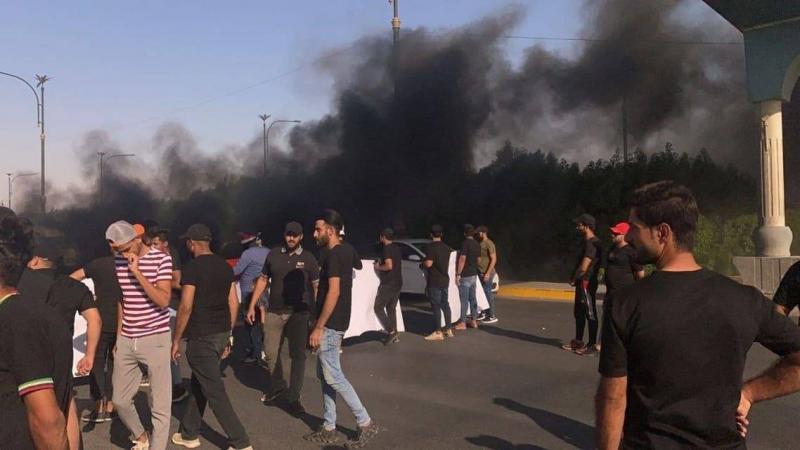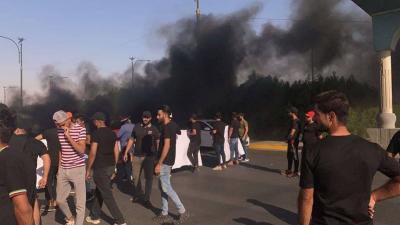Events in Iraq regarding the parliamentary elections are rapidly escalating. Iraqi media reported that groups are blocking a vital road northeast of Baghdad in protest against the election results. Iran-aligned parties have intensified their protests, with Al-Ahd Iraqi channel reporting demonstrations and road closures in Diyala province against the election outcomes. A security source indicated that protesters closed the Al-Husseiniya road "to object to the results of the recent elections." Protests rejecting the election results have also emerged in the Iraqi city of Basra.
Prime Minister Mustafa Al-Kadhimi remarked that politics has come to mean extortion, lies, conflict, and deceiving the people for some. In a speech during a celebration at Imam Abu Hanifa Al-Nu'man Mosque on the occasion of the Prophet's birthday, he stated, "Today, we fulfill our promise to our people to conduct fair early elections, and the people have chosen their representatives; these new MPs will perform their role in the new parliament." He added that the new MPs have moral and national duties towards their people, including the duty to restore trust in political work and in democracy. Al-Kadhimi noted that the current government has faced severe conditions, including financial, economic, and health crises represented by COVID-19, along with numerous other challenges, but they have overcome them.
The Fatah Alliance, which includes the majority of Iraqi militias, rejected the election results. They threatened to respond if the commission does not backtrack on these results. The Coordination Framework of Iran-aligned Iraqi parties accused foreign entities of manipulating the elections and accused Al-Kadhimi's government of falsifying the election results, calling for protests against them. The Iraqi Electoral Commission confirmed in statements to Al-Arabiya that it faced no pressure during the electoral process.
In the meantime, Fatah Alliance leader Abu Diyaa Al-Basri stated that there would be a reaction from the alliance corresponding to the announcement of the final results, indicating that the alliance has provided "irrefutable" evidence of electoral fraud. Al-Basri told Rudaw Media Network, "The Fatah Alliance has presented all conclusive and irrefutable evidence of the fraud that occurred in the Iraqi elections, both internally and externally," noting that "Fatah reached this conclusion about the fraud with conclusive and irrefutable evidence." He added, "It remains to be seen whether the commission will consider this evidence or not," affirming that "if the commission does not take into account the evidence, we will have another position,” stating that “the position is not a threat but a stance against the fraud."
Al-Basri mentioned that "the reaction will be proportional to the result that the commission announces," and that "if the commission attempts to correct something, the reaction of Fatah will certainly differ from its initial response." He confirmed that "with the reactions and results that cannot be accepted by the coalition, the Fatah Alliance will not leave the arena for America and its allies to play with."
The preliminary results of the Iraqi parliamentary elections show that the Sairoon Alliance, backed by Shiite leader Muqtada Al-Sadr, leads with seventy-three seats out of three hundred twenty-nine. The Iraqi Electoral Commission announced that these results are not final, noting the possibility of contesting them. The voter turnout for the elections reached 43%, with the total number of voters exceeding six million six hundred thousand.
The commission revealed the participation of international and Arab teams to monitor the elections across the country. A member of the media team in the commission, Imad Jameel, stated previously that the international teams participating in monitoring the parliamentary elections are from the United Nations, the European Union, the Arab League, the Islamic Conference, and Arab and foreign embassies in Iraq. Jameel also confirmed that teams from organizations interested in electoral affairs would be distributed with the mentioned teams across all 83 electoral districts.




